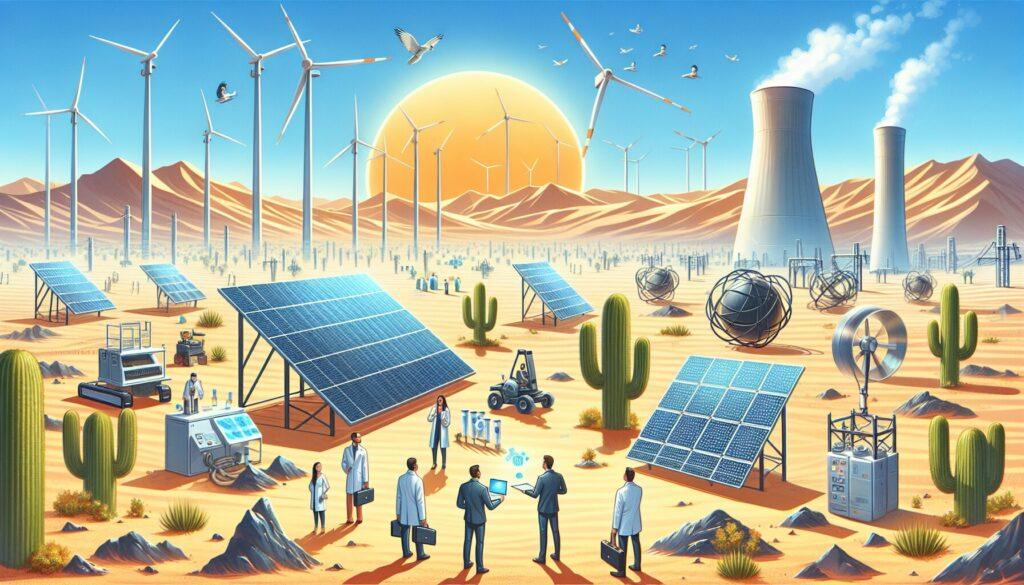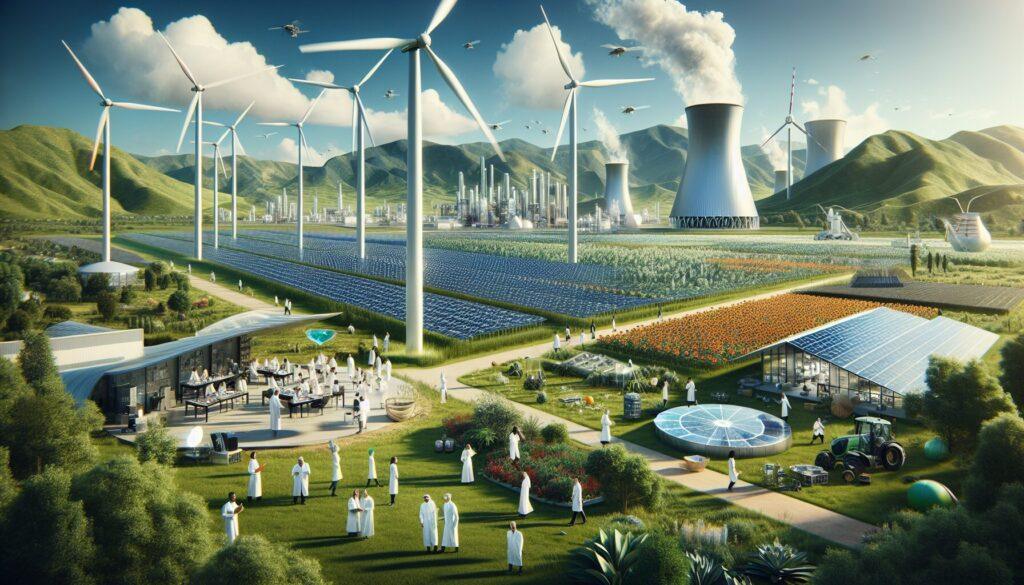Clean Energy vs Fossil Fuels
The debate between the utilization of Clean Energy and reliance on fossil fuels is a pivotal discourse shaping the future of our global energy landscape. While fossil fuels have historically been the backbone of industrial development, providing reliable and high-density energy, their environmental impact is no longer tenable in the face of climate change.
Renewable energy sources, such as solar, wind, and hydroelectric power, offer a sustainable alternative, promising a reduction in greenhouse gas emissions and a pathway to a cleaner, more resilient energy grid.
The transition to these cleaner energy options is not only imperative for environmental preservation but also for the innovation and economic opportunities that come with the advancement of green technologies. In the moment’s quickly evolving power panorama, the debate between clean power and fossil fuels takes center stage.
As international challenges corresponding to local weather change and useful resource depletion rise, the want for sustainable options turns into something more and more pressing. This article delves into the key elements of fresh power versus fossil fuels, offering insights into their impacts, advantages, and the path ahead.

Q&A: Clean Energy Versus Fossil Fuels
Q1: What are the main variations between clean power and fossil fuels?
A1: The fundamental difference between clean power and fossil fuels lies in their environmental impact and sustainability. Clean power, also known as renewable energy, is derived from natural processes that are continuously replenished, such as sunlight, wind, and water flow.
In contrast, fossil fuels, like coal, oil, and natural gas, are finite resources formed from the ancient remains of plants and animals, and their extraction and combustion release significant amounts of greenhouse gases into the atmosphere, contributing to climate change and pollution.
Clean energy technologies generally have a much lower carbon footprint and are designed to provide a long-term solution to our energy needs without depleting resources or damaging ecosystems. Clean power refers to renewable sources like photovoltaic, wind, hydroelectric, and geothermal energy.
These sources are naturally replenished and produce minimal environmental influence. Fossil fuels, together with coal, oil, and pure gasoline, are non-renewable and launch vital greenhouse gases when burned. The extraction and consumption of fossil fuels contribute to environmental degradation and local weather change.
Q2: How does the value of fresh power compare to fossil fuels?
A2: The cost dynamics of clean energy versus fossil fuels have shifted significantly in recent years. Initially, renewable energy sources such as wind and solar were more expensive than traditional fossil fuels.
However, advancements in technology and increased production have led to a substantial decrease in the cost of renewable energy, making it increasingly competitive with, and in some cases cheaper than, fossil fuels.
This economic shift, coupled with the potential for long-term savings and the absence of greenhouse gas emissions, is making clean energy a more attractive option for both consumers and investors.
Historically, fossil fuels have been cheaper than renewable power choices. However, developments in expertise and elevated manufacturing scale have considerably diminished the value of fresh power.
In many areas, photovoltaic and wind energy are actually cheaper than coal and pure gasoline. The International Renewable Energy Agency (IRENA) experiences that the value of solar energy has dropped by 82% since 2010.

Q3: What are the environmental impacts of each power source?
A3: The environmental impacts of renewable energy sources such as solar and wind are significantly lower than those of fossil fuels like coal and natural gas. Solar panels and wind turbines produce energy without emitting greenhouse gases during operation, which is crucial in the fight against climate change.
Additionally, these renewable sources do not produce air pollutants that can lead to health problems in humans, unlike the particulate matter and noxious gases released by the combustion of fossil fuels.
However, it’s important to consider the entire lifecycle of these technologies, as manufacturing and disposal processes do have environmental footprints that must be managed responsibly. Clean power sources have minimal environmental influence, as they don’t emit dangerous pollution or contribute to local weather change.
In distinction, fossil fuels are main contributors to air pollution, water contamination, and greenhouse gas emissions. The burning of fossil fuels is the largest source of carbon dioxide emissions, which are the number one trigger of global warming.
This fall: Can clean power absolutely replace fossil fuels?
A4: The transition to clean power is not just a possibility but a necessity in the face of the escalating climate crisis. Renewable energy sources such as solar, wind, and hydroelectric power offer sustainable alternatives that can meet our energy demands without the detrimental environmental impacts associated with fossil fuels.
Governments and industries worldwide are investing in clean energy technologies, recognizing that the shift towards renewables is critical for reducing emissions and curbing the effects of global warming.
However, the question remains whether these efforts can scale quickly enough to fully replace fossil fuels in the near future. While clear power can considerably scale back reliance on fossil fuels, a whole transition requires substantial infrastructure modifications and coverage assistance.
Storage applied sciences, grid enhancements, and power effectivity measures are important to make sure a dependable and constant power supply is provided. Countries like Denmark and Germany have made vital progress, with renewables accounting for over 40% of their electrical energy technology.
Q5: What are the financial implications of switching to wash power?
A5: The financial implications of transitioning to clean energy are multifaceted. Initially, the investment in renewable energy infrastructure, such as wind turbines and solar panels, can be substantial.
However, over time, these costs are often offset by the savings on fuel expenses, as renewables like wind and solar have no fuel costs after installation. Moreover, the shift towards clean energy can also drive job creation in new industries, contributing to economic growth.
Governments may also implement subsidies and incentives to encourage the adoption of renewables, which can alter the financial dynamics and accelerate the transition. Transitioning to wind power can drive financial development by creating jobs in manufacturing, setup, and upkeep of renewable power programs.
According to the International Labour Organization (ILO), the renewable power sector might create 24 million jobs globally by 2030. However, areas depending on fossil gasoline industries might face financial challenges, necessitating insurance policies for a simple transition.

Conclusion
To mitigate the potential negative impacts on communities reliant on fossil fuels, it is essential to develop comprehensive strategies that include retraining programs, investment in local renewable energy projects, and financial support mechanisms.
Governments, alongside private sector stakeholders, must prioritize the creation of an ecosystem that not only fosters innovation in green technologies but also ensures an equitable distribution of the new employment opportunities.
By doing so, the shift towards a greener economy can be both a sustainable and inclusive journey, minimizing disruptions and maximizing benefits for all involved.
The way forward for power lies in placing a steadiness between sustainable improvement and financial viability. Clean power presents a promising pathway to mitigate local weather change while driving financial progress.
As international locations worldwide decide to decrease carbon emissions, the transition from fossil fuels to wash power turns into an integral part of securing a sustainable future. Embracing this alteration not solely protects the surroundings but additionally fosters a resilient and modern power panorama.
Table: Comparison of Clean Energy and Fossil Fuels
| Aspect | Clean Energy | Fossil Fuels |
|---|---|---|
| Source | Renewable | Non-renewable |
| Environmental Impact | Low | High |
| Cost Trend | Decreasing | Variable |
| Job Creation | High potential | Declining in some areas |
| Carbon Emissions | Minimal | Significant |
The transition from fossil fuels to clean energy is not only an environmental imperative but also an economic one. As the cost of renewable energy sources like solar and wind continues to fall, they become increasingly competitive with traditional energy sources, even without factoring in the long-term environmental benefits.
Moreover, the renewable energy sector is a burgeoning frontier for job creation, offering a variety of positions ranging from research and development to manufacturing and installation, signaling a dynamic shift in the global energy job market. For additional studying, go to the International Renewable Energy Agency and the International Labour Organization.
As the renewable energy sector continues to expand, the demand for skilled professionals in AI personalization is also on the rise. This specialized branch of artificial intelligence focuses on tailoring energy solutions to individual consumer patterns, optimizing energy consumption, and enhancing user experiences.
By harnessing the power of machine learning and predictive analytics, AI personalization is not only revolutionizing the way we interact with energy systems but also contributing to a more efficient and sustainable energy landscape.
As we transfer in the direction of an extra sustainable future, the alternative between clean power and fossil fuels is not only a technological resolution but also a dedication to our planet’s well-being and financial prosperity. Embrace the transition to wash power and contribute to a greener, extra resilient future.


